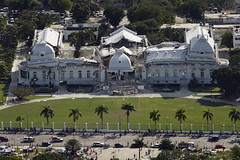These days everybody wants to help the poor people of Haiti – and that’s obviously a good thing but when I think about Haiti it makes me wonder what the proper course of action is for outside nations to help that struggling country. I’m not talking about the proper course of action to help after the earthquake last week – that’s relatively simple to answer: get aid in supplies and personnel on the ground quickly to restore order and save lives (even though it’s not an easy task). I’m talking about the real fundamental problems that have been plaguing the nation of Haiti as demonstrated by their history of the last 20 years.
In the last 20 years there have been four regular elections – the winner of all four has alternated between Jean-Bertrand Aristide and his good friend René Préval. As far as I understand they never ran against each other so this is not a matter of oscillating between political parties. Both times that Aristide was elected he was later exiled. The first time he was eventually returned to power thanks to U.S. intervention – the second time it was the U.S. that sent him into exile. Hence my question – what is to be done for Haiti?
Regular elections in Haiti should be scheduled for late this year. Perhaps at that time the people of Haiti can start fresh trying to bring stability and prosperity to their nation, but if they elected the same man twice in ten years who they then accused of corruption and gave him a vote of no confidence I’m not sure that they know how to solve their problems.
Assuming that their recent history holds and they continue to face corruption and poverty long after the devastation of the earthquake is behind them, what is the proper help that other nations might offer? In that case I doubt that perpetual aid is the solution. What they seem to need is ingenuity and I don’t know of any way to lend such a crucial commodity. We are well practiced at impeding constructive ingenuity, but not so successful in fostering it.


One of the problems of democracy is that the majority does not always make the best decisions. However, in this case it is the people of Haiti who must make the decision. The best thing we can do is let the Haitian people determine the best way to recover, organize their economy, and make their own decisions.
You may want to go back a bit further in your history. Perhaps at least to the mid-1950’s when Papa Doc Duvalier took over as dictator and used death squads and terror to pillage the nation for his own benefit with the full cooperation of the United States. The Duvalier reign of terror lasted until 1986. When a Constitution was finally put in place and Aristede was elected, he only lasted a few months before a military coup d’etat sent him into exile. Unfortunately Haiti has never had a stable democratic government with non-violent changes in leadership. Over the last 60 years, the US has intervened often, sometimes on the side of democracy and sometimes against it. Given our record there, we should bow out. We bear a partial responsibility for Haiti’s plight, but we cannot build them a nation. They’ll have to figure that one out on their own. I hope they get the opportunity to do so this time.
I absolutely agree that the people of Haiti must make the decisions – anything else is unsustainable so long as they remain a sovereign nation. I ask the question because we, like other nations will be offering to help and we should be mindful of what we offer. I focused my post on the instability of the last 20 years but you are absolutely right that we can go further back. In fact we can go back through their entire history since the European colonization of the western hemisphere. Everything prior to their independence can be blamed on the colonizing nations (such as the dispute between France and Spain) but in their 206 years as an independent nation they have had 32 coups (average of one every 6 years so they’re due for another one about now). Their history is littered with many more examples of oppressive government and social chaos than it is with any form of humane and stable society.
Your final statement is exactly right:
Here’s an example of the kind of policy America is actually pursuing in Haiti at present. Here’s another. There are times when human need is so great that worrying about political concerns is practically immoral. I heard an NPR commentator yesterday asserting that because the earthquake had destroyed the government buildings in Port-au-Prince, it would be necessary for the “international community” to devise and setup a new government for Haiti. By this logic, if an earthquake destroys the US Capital, the EU and China should get together and draw us up a new Constitution.
Like I said originally, the answer of what we should do in the aftermath of the earthquake is pretty straightforward, but for those who have exhausted any immediate help they can give it would be wise for them to consider a long term perspective on how we should or should not interact with Haiti. After all, their suffering in the aftermath of the earthquake is worse than it might have been if their economy had been strong before the earthquake and how we and other nations interact politically with Haiti has an effect on the strength of their economy as does their political stability.